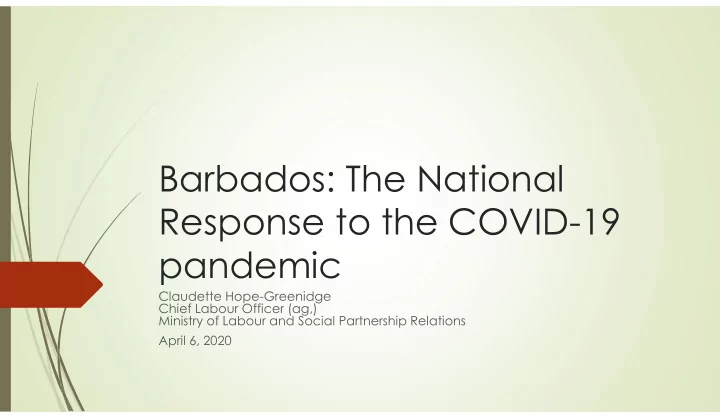

Barbados: The National Response to the COVID-19 pandemic Claudette Hope-Greenidge Chief Labour Officer (ag,) Ministry of Labour and Social Partnership Relations April 6, 2020
Overview � This presentation is designed to provide an understanding of Barbados’ response to Preserving and Extending Decent Work as a key pillar in the National Response to the COVID-19 pandemic � Status as at April 4, 2020 � Ministry of Health and Wellness has disclosed 56 positive cases; I death � Significant lay-offs expected as a result of closure of businesses, particularly in the tourism sector
National initiatives to protect employment and business
National initiatives in response to COVID-19 � In the context of Barbados, the consequences of COVID-19 are reverberating throughout the all sectors of the economy, with severe negative consequences for labour and employers � Persons in the tourism, construction, distributive trades and related sectors, are now facing disruption to business and employment (e.g. lay- offs or short time, alternative working arrangements, redundancy)
Initiatives at a glance… � NIS Support � GOB has pledged supplemental support for Unemployment Fund to cater to expected large number of claims � Unemployment benefits to be provided for six months in the case of full job loss � 60% of insurable earnings to be paid in respect of short-time � “Homes for All” Programme � Use of BD $50 million from Housing Credit Fund to unlock BD $200 million from banks to assist 1,00 households to construct and own affordable housing
Initiatives at a glance… � Household Survival Programme � BD $20 million programme to be implemented through three initiatives to assist displaced workers � Welfare Support � Income of at least BD $600 per month to be provided where there is no one employed in a household as a result of the effects of COVID-19 � Enhanced support for welfare recipients – 40% increase on normal rates � “Adopt a Family” programme � Government has invited households with an income of more than $100,000 to adopt a vulnerable family to provide support in excess of welfare payments or to contribute to the newly established Adopt a Family Fund
Initiatives at a glance… � Employers: Deferral of NIS contributions � Employers retaining more than 75% of their staff complement will be able to defer employer contributions for the next 3 months , with the possibility for an extension of a further 3 months � Other � Public sector initiatives being matched by private sector relief mechanisms � Financial institutions have agreed to six-month moratorium for payments on existing loans and mortgages for affected persons and businesses � Rent deferral/waiver in selected circumstances
The role of the Ministry of Labour and Social Partnership Relations
How we are responding in these times of crisis � The Ministry has the specific mandate to liaise with the social partners � Continues to facilitate discussions with and among the social partners – the Sub-Committee of the Social Partnership met under the chairmanship of the Minister of Labour to discuss the implications for the actors in the system of labour administration � Sub-committee addressed matters including: � The identification of essential service / key workers who are important to continuation of operations � Work arrangements and alternative work arrangements (home working / teleworking, hours of operation, staff rotation)
How we are responding in these times of crisis � Publication of advisories on key employer and employee rights and responsibilities as provided for by labour legislation (layoff, restructuring, holiday with pay, right to refuse dangerous work) � Collaborated with the social partners on the development of protocols (e.g. delivery personnel and curbside operations) � Continuation of services to employers and employees and their representatives via homeworking
The use of Social Dialogue and the participation of Tripartite Institutions
Uniting our efforts… � Collaboration among the social partners has been robust. Widescale consultation with representatives of labour, employers, specific private sector interests and government, led to agreements including: � the identification of essential services; adjustments to work arrangements specific to the national predefined response stages to the pandemic; favourable accommodation of employees who have underlying health risks or certain family responsibilities � There is frequent exchange of information and ideas as evidenced by the ongoing collaboration among the social partners, in planning and in the response to matters as they arise
Uniting our efforts…. � The governance of the National Insurance Scheme (key pillar in response) is comprised of representatives from government, labour and employers � Facilitates full tripartite consideration of matters related to the adverse impacts of COVID-19 � The employers’ representative, the Barbados Employers Confederation (BEC) has developed recommended practices for employers on a range of matters including: � Business continuity planning � Managing the crisis
Areas of Challenge and Opportunities
Challenges � COVID-19 presents a suite of unprecedented challenges due to unique circumstances � Particular challenges include: � Lack of reach in the informal sector � vulnerabilities � perceived limited coverage for unemployment � limited human resource capacity to respond to high number requests � Perceived inflexibility of legislation to address some matters ( e.g. holiday with pay, rights on layoff and short-time, right to refuse dangerous work) � Balancing the demands presented by the crisis with the pre-existing demands for the delivery of service
Opportunities � Improvements to online/web-based sources of information � Determination of extent of non-traditional work-arrangements � Consideration of codification of labour legislation and reform � Critical examination of in-house systems for labour administration (e.g., inspections, conciliation, handling queries / complaints, communication with the public, OSH) � Examination of the appropriateness of current labour laws in the context of the current or similar crisis � Collaboration with social partners in the development of training and education programmes
Recommend
More recommend